Department Profile
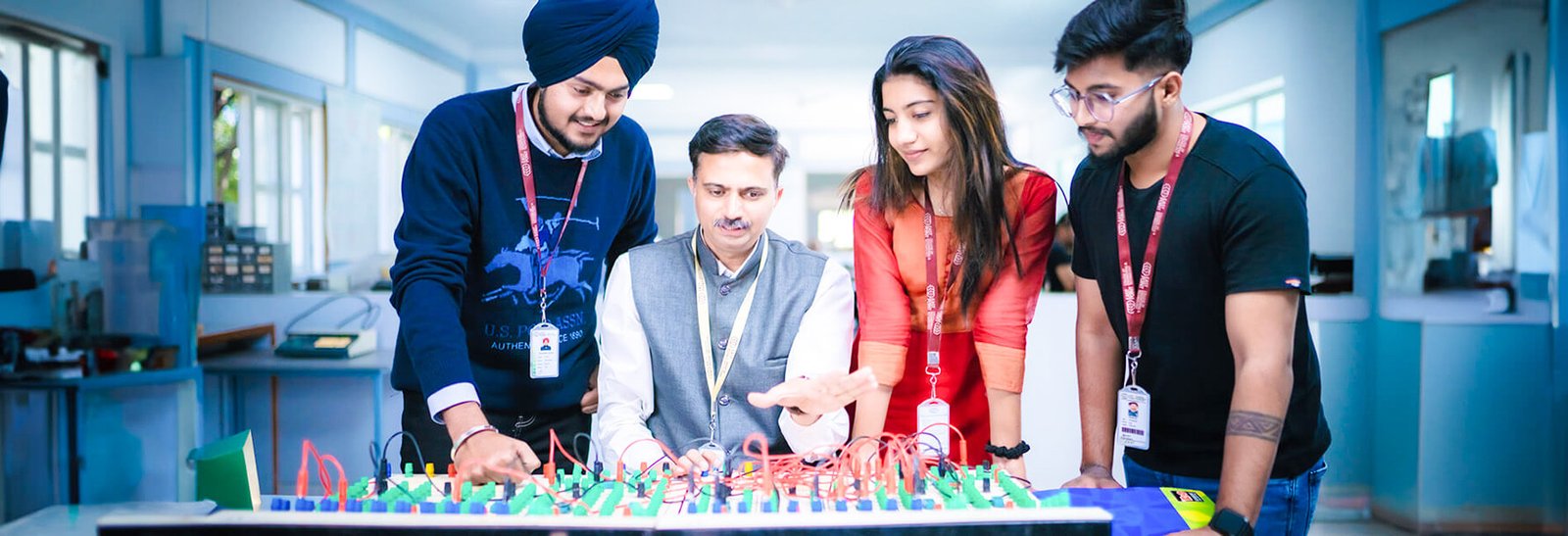
The Department of Electronics & Communication Engineering was established in 1999 and offers a four-year Bachelor of Engineering program affiliated with Visvesvaraya Technological University, approved by AICTE, and accredited with NBA Certification. Committed to excellence, the department prioritizes fostering a robust foundation in Electronics & Communication Engineering; ensuring students are proficient in the latest technologies shaping the field.
It is recognized as a VTU Research center for pursuing a PhD. The department encourages research and innovation. The department's expertise spans Signal and Image Processing, Antennas, Wireless Sensor Networks, Control Systems, VLSI, Communication, Biomedical Signal Processing, Machine Learning, and Deep Learning. Faculty members actively contribute to research papers, publications, and patents, enriching the academic atmosphere and providing students with exposure to cutting-edge developments.
It is recognized as a VTU Research center for pursuing a PhD. The department's expertise spans The department's curriculum, designed by VTU, ensures a strong foundation in electronics, communication systems, signal processing, and emerging technologies. Students gain hands-on experience through cutting-edge laboratories, including Analog and Digital Electronics Lab, Microcontroller/HDL Lab, Computer Networks/DSP Lab, Communication Lab, VLSI/Embedded Systems Lab, Project/IOT Lab, and R&D Lab. Collaborations with industry leaders provide access to internships, guest lectures, and insights into the latest industry trends, enhancing students' readiness for the dynamic field of Electronics and Communication Engineering.
In addition, the department offers value added programs such as the ARM University Program, providing fundamental and practical knowledge for embedded system design, the Texas Instruments Innovation Lab, enhancing hands-on experiences with advanced Analog and embedded processing technologies, and the Cisco Networking Academy, empowering students with career opportunities in cyber-security, aligning their skills with industry demands.
HoD Message
Dear Students,
Welcome to the Department of Electronics and Communication Engineering at East Point College of Engineering and Technology, Bangalore. Established in 1999, our department has been a pioneer in delivering quality education. The department is accredited by the National Board of Accreditation (NBA) and is recognized as a research centre for pursuing Ph.D. in Visvesvaraya Technological University.
With experienced faculty members committed to engineering education, we foster an environment where learning is enjoyable and interactive. Our focus on competency and skill development ensures our students are well-equipped for the job market. Our goal is to holistically develop students, fostering innovation, creativity, and a passion for technology.
Collaborations with industry leaders like CISCO, ARM University, and Texas Instruments provide valuable training opportunities for both faculty and students, allowing them to tackle real-world challenges. We also engage in scientific research through partnerships with organizations like LRDE, DRDO, and international academic collaborations with institutions like the University of Sannio, Benevento, Italy.

Dr. G S Yogesh
Vice Principal - EPCET
East Point College of Engineering and Technology
Recognized as a nodal centre for the IIRS-ISRO Outreach Programme, our department offers excellent lab facilities that are continually upgraded, providing ample opportunities for students to innovate and think outside the box. Join us on a journey of learning, innovation, and growth in the exciting field of Electronics and Communication Engineering.
Join us in the world of Electronics and Communication Engineering to shine brightly with a successful and accomplished career.
Laboratories
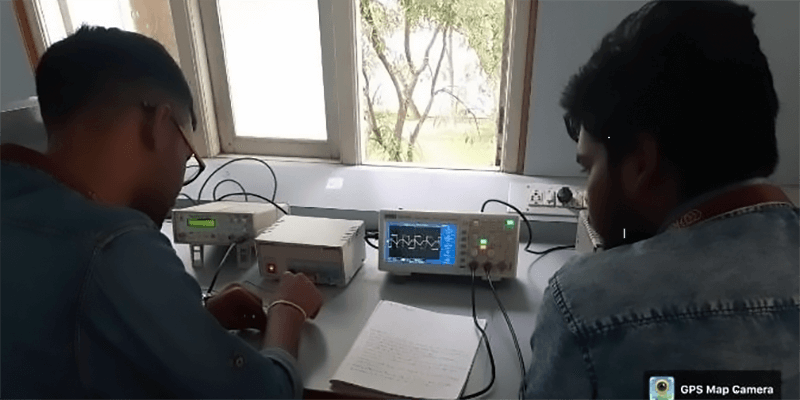
Analog and digital electronics laboratory
Analog and digital electronics laboratory :- Analog and digital electronics laboratory is well provided with different equipment like Regulated Power Supplies, Function Generators, Digital Storage Oscilloscopes (DSO), Cathode Ray Oscilloscopes (CRO), Regulated power supply, Digital and Analog meters of a wide range and digital trainer kits. This lab gives practical observation of the different characteristics of Electrical / Electronic elements when connected differently. It provides provision for students to design and analyse the digital circuit. Overall this laboratory provides a good foundation on Electrical/Electronic components and digital circuits to the students in the initial years.
Microcontroller Laboratory/HDL Laboratory :- Microcontroller Laboratory/HDL Laboratory gives the idea of microcontrollers and its interfacing to peripheral devices. In this lab, the students are trained to write the programs for different manipulations with the microcontroller in Assembly Language/C programming. This lab is also useful for the students to know the interfacing of the microcontroller to different applications like display, control interface, etc. The students are also trained to write verilog code for various digital circuits, simulate the code and download the program on Spartan3 FPGA kit. The students also learn to interface external devices such as stepper motor, DC motor, seven segment display, hex keypad and so on with FPGA board.
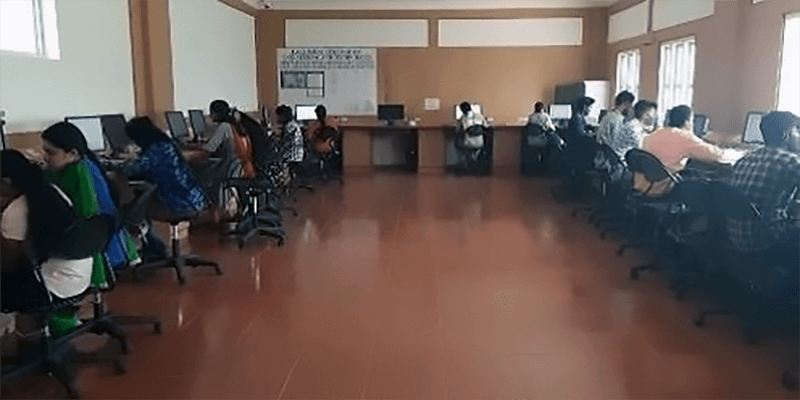
Microcontroller Laboratory/HDL Laboratory

Computer Networks Laboratory/DSP Laboratory
Computer Networks Laboratory/DSP Laboratory :- Computer Networks Laboratory/DSP Laboratory This lab is equipped with computers which are having various softwares installed in them to perform computations and simulation of networks. Major equipments include MatlabR2013a, Code Composer Studio 3.1, DSP TMS320C6748 hardware kits, NCTUNS Simulator, VMWare Virtual Machine and Dev C++ software. In this lab, students mainly focus on computing the transformations such as DFT, FFT of the signals, designing and developing different types of filters. This lab allows students to implement networking concepts and algorithms. Simulation of point to point network through nodes, routers, switches etc and analysis of various parameters is performed using NCTUNS Simulator.
Communication Laboratory :- Communication Laboratory provides facility for students to implement different types of modulators and demodulators and various techniques used for the processing of the analog (continuous) and digital signals for transmission and reception. Major equipment includes microwave test bench with Klystron and Gunn diode source, microstrip source and components, Regulated Power supplies (RPS), Digital Storage Oscilloscope (DSO), function generators and computers to simulate modulated and demodulated waveforms. The outcome of this laboratory is to make the students to understand the fundamentals of communication systems.
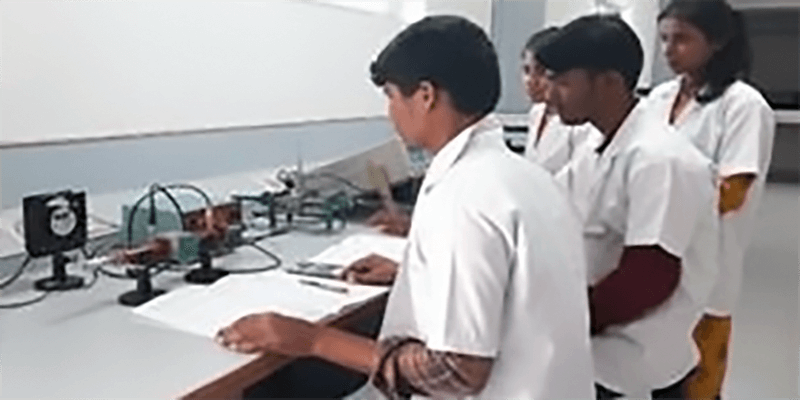
Communication Laboratory
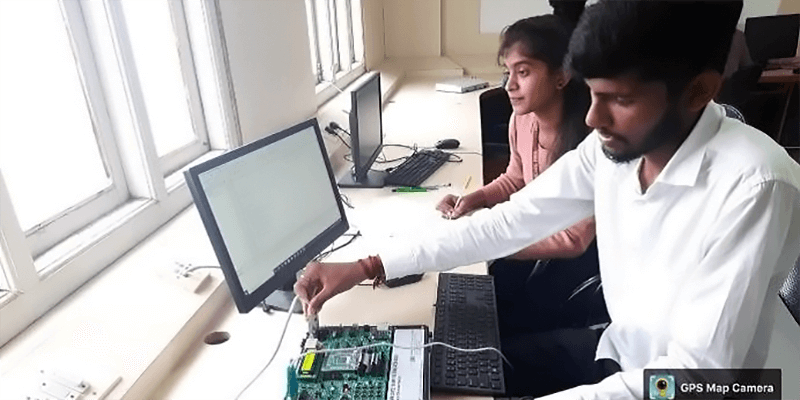
VLSI Laboratory /Embedded Systems Laboratory
VLSI Laboratory /Embedded Systems Laboratory focuses on fundamental and advanced principles of VLSI circuit design in digital and analog domain. This laboratory is used for conducting the UG/PG practical’s and to provide hands on design experience with professional design (EDA) platforms like cadence software tools. This laboratory has the 25 user license of cadence software tool. This laboratory also provides ARM Cortex M3 processor kits and keil μvision v3 software tools for developing embedded C programs used for interfacing external input output devices. It also helps students to implement assembly level programs for performing arithmetic, logical operations and manipulation of data.
Project/IOT Laboratory :- Project/IOT Laboratory facilities computers, IOT boards such as Arduino UNO, nodeMCU and Raspberry pi board to support students in implementation of projects. The prime objective of this laboratory is to provide facilities to student’s community to do projects. The students are also provided with Wi-Fi facility to have access to internet and find out latest technological advancement to implement it in their project.
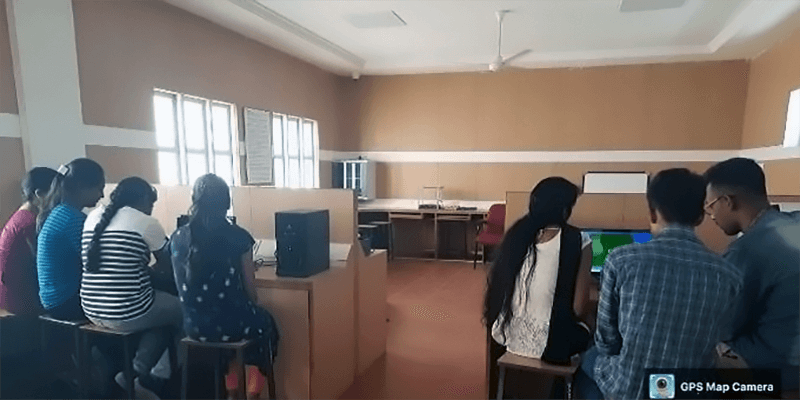
Project/IOT Laboratory
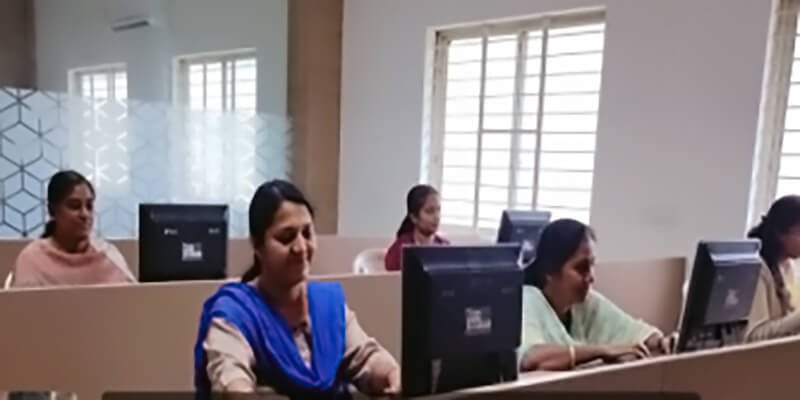
R&D Laboratory
R&D Laboratory :- R&D Laboratory provides facilities for research scholars and faculties to carryout research work. This laboratory has MATLAB licensed software with SIMULINK, communication, DSP system, image processing, signal processing, statistical and machine learning tool box to enable users to carry out research work in various domains. It also has an antenna analyzer that helps users to perform spectrum analysis of signals received from antenna connected to it.
Program Overview
Cutting-edge Curriculum: VTU curriculum is carefully designed to provide a strong foundation in electronics, communication systems, signal processing, and emerging technologies. Students learn about digital electronics, wireless communication, embedded systems, and advanced topics like Internet of Things (IoT) and 5G technology. We have established strong ties with industry leaders, ensuring our students have access to industry experts, internships, and guest lectures. These collaborations enable students to gain valuable insights into the latest industry trends, technologies, and best practices.
Program Specific Outcomes
- PSO1: To conceptualize, model, design, simulate, analyse, develop, test, and validate computing systems and solve technical problems arising in the field of Computer Science & Engineering.
- PSO2: To specialize in the sub-areas of Computer Science and Engineering such as Cloud Computing, Robotic Process Automation, Cyber Security, Big data Analytics, User Interface Design and IOT to meet industry requirements.
- PSO3: To build innovative solutions to meet the demands of the industry using appropriate tools and techniques.
Program Outcomes
- Engineering knowledge :- Apply the knowledge of mathematics, science, engineering fundamentals, and an engineering specialization to the solution of complex engineering problems.
- Problem analysis :- Identify, formulate, review research literature, and analyse complex engineering problems reaching substantiated conclusions using first principles of mathematics, natural sciences, and engineering sciences.
- Design/development of solutions :- Design solutions for complex engineering problems and design system components or processes that meet the specified needs with appropriate consideration for the public health and safety, and the cultural, societal, and environmental considerations.
- Conduct investigations of complex problems :- Use research-based knowledge and research methods including design of experiments, analysis and interpretation of data, and synthesis of the information to provide valid conclusions.
- Modern tool usage :- Create, select, and apply appropriate techniques, resources, and modern engineering and IT tools including prediction and modelling to complex engineering activities with an understanding of the limitations.
- The engineer and society :- Apply reasoning informed by the contextual knowledge to assess societal, health, safety, legal and cultural issues and the consequent responsibilities relevant to the professional engineering practice.
- Environment and sustainability :- Understand the impact of the professional engineering solutions in societal and environmental contexts, and demonstrate the knowledge of, and need for sustainable development.
- Ethics :- Apply ethical principles and commit to professional ethics and responsibilities and norms of the engineering practice.
- Individual and team work :- Function effectively as an individual, and as a member or leader in diverse teams, and in multidisciplinary settings.
- Communication :- Communicate effectively on complex engineering activities with the engineering community and with society at large, such as, being able to comprehend and write effective reports and design documentation, make effective presentations, and give and receive clear instructions.
- Project management and finance :- Demonstrate knowledge and understanding of the Engineering and management principles and apply these to one’s own work, as a member and leader in a team, to manage projects and in multidisciplinary environments.
- Life -long learning :- Recognize the need for and have the preparation and ability to engage in independent and life -long learning in the broadest context of technological change.
Program Educational Objectives (PEOs)
- PEO 1. To produce graduates to have successful professional career with the acquired knowledge in Electronics and Communication Engineering to analyze, design, develop and implement electronic systems.
- PEO 2. To produce graduates who apply their engineering skills and develop ingenious solutions for real world problems.
- PEO 3. To produce graduates who can exhibit leadership qualities, ethical values and adapt to current trends by engaging in lifelong learning.

